A garage door operator, commonly known as a garage door opener, is a vital component of your garage door system. Its lifespan depends on several factors, including quality, maintenance, and frequency of use.
Typical Lifespan
- Standard Lifespan: Most garage door operators last 10 to 15 years with average use.
- High-Quality Models: Premium models or those with heavy-duty components can last up to 20 years or more with proper care.
- Frequent Use: In high-usage environments, such as commercial settings, the lifespan may reduce to 7 to 10 years due to wear and tear.
Factors That Affect Longevity
- Quality of the Operator
- Higher-end models with durable parts tend to last longer.
- Cheaper units may fail sooner due to lower-quality components.
- Frequency of Use
- Operators in households with multiple vehicles or high-traffic garages may wear out faster.
- Maintenance
- Regular lubrication, inspection, and minor repairs can significantly extend the operator’s lifespan.
- Neglected systems are more prone to breakdowns and reduced functionality.
- Environmental Conditions
- Humid or corrosive environments can cause rust or electrical issues, shortening the lifespan.
- Extreme temperatures may also impact the operator’s motor and electronic components.
Signs an Operator Needs Replacement
- Unusual Noises: Grinding or excessive noise may indicate worn-out gears or a failing motor.
- Inconsistent Operation: The door struggles to open/close or operates intermittently.
- Outdated Technology: Older operators may lack safety features like auto-reverse or smart compatibility.
- Frequent Repairs: Repeated breakdowns may cost more than replacing the unit.
Extending the Lifespan
- Regular Maintenance
- Inspect belts, chains, and other moving parts for wear.
- Lubricate hinges, rollers, and springs to reduce strain on the operator.
- Upgrade Components
- Replace worn gears or belts as needed instead of waiting for the entire operator to fail.
- Use High-Quality Parts
- Choose operators with durable motors, advanced safety features, and energy-efficient designs.
- Limit Overuse
- Avoid unnecessary cycles by minimizing frequent operation.
When to Replace the Operator
If your garage door operator is over a decade old and experiencing frequent problems, it may be time to invest in a new unit. Modern operators are quieter, more efficient, and often include smart home integration and enhanced safety features.
By choosing a quality product and performing routine maintenance, you can maximize the lifespan of your garage door operator and ensure reliable performance for years to come.

